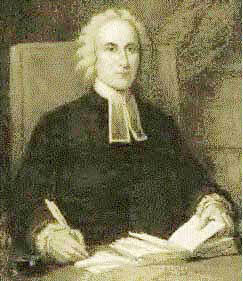
by Hans DePold, town historian
(Published in the Bolton Community News, December 2003)
This year, 280 years after he became Bolton's first pastor, Jonathan Edwards is still recognized as a major literary and intellectual figure. Yale University, his alma mater, is producing a massive scholarly edition of his works in honor of the 300th anniversary of his birth. We now have more of Edwards's writings available than ever before, giving me the opportunity to read his diaries and electronically search many of his books.
Jonathan Edwards was born October 5, 1703, in East Windsor, Connecticut, just three months after John Wesley and three years before Benjamin Franklin. His father, Timothy, was pastor in East Windsor. His mother was the daughter of Pastor Solomon Stoddard of Northhampton, Mass., who was known as the "Pope of the Connecticut Valley." As a boy, Edwards showed precocious talent. Just before his 13th birthday he went off to Yale College, where he graduated as class valedictorian with all honors at age 17. But Edwards continued to be troubled with the general perception of God taught at this time.
After completing his studies at Yale, he went to New York City for a brief time and helped in a small Presbyterian congregation. For unknown reasons, perhaps due to his youth, he did not become their pastor. He returned to Connecticut by boat in April 1723. At a Bolton town meeting on May 27, 1723, it was voted to call Rev. Jonathan Edwards, age 20, to become the first pastor in Bolton. The Bolton Congregational Church history (1920 edition) has on its first page the following quote from Jonathan Edwards to the Bolton parish: "I shall count it with a smile of Providence upon me if ever I should be settled among such a people as your society seems to be."
Rev. Edwards spent the summer with his parents in East Windsor and visited Bolton, then a small crossroads hamlet, in June of 1723. In his diary he describes his spiritual reconciliation:
"...there came into my soul, and was as it were diffused through it, a sense of the glory of the Divine Being; a new sense, quite different from any thing I ever experienced before. I thought with myself, how excellent a Being that was, and how happy I should be, if I might enjoy that God, and be rapt up to him in heaven, and be as it were swallowed up in him for ever!
"The appearance of every thing was altered. God's excellency, his wisdom, his purity and love, seemed to appear in every thing; in the sun, moon, and stars; in the clouds, and blue sky, in the grass, flowers, trees; in the water, and all nature I spent most of my time in thinking of divine things, often walking alone in the woods, and solitary places, for meditation, soliloquy, and prayer, and converse with God."
Edwards continued his studies and delivered his Master of Arts oration (in Latin) at Yale on September 20, 1723. He was promised a teaching position at Yale as soon as an opening occurred, but as there was no immediate vacancy in the office of tutor, he took the open position as the first pastor of Bolton. In an official entry in the Town Record Book of Bolton dated 11 November 1723, there is written by Edwards: "Upon the terms that are here recorded I do consent to be settled Pastor of the town of Bolton." From his first official pastoral position it was only a day's walk (15 miles) to visit his family in East Windsor.
But then in May of 1724, the position as tutor at Yale was again open. Within two weeks of receiving the offer, he left Bolton and was on his way to New Haven where he assumed the position of senior tutor at Yale in June 1724. He arranged to have his classmate, Reverend Thomas White, take his place in Bolton starting October 25, 1725.
Later, in his published "Personal Narrative," Edwards specifically links his watershed religious experiences to Bolton, no doubt in the fields of the parsonage in Bolton, which later became the Rose Farm. He makes it clear that this blissful period lasted for the entire period he was pastor in Bolton and ended when he left in 1724 to return to Yale as teacher.
"It was a comfort to think of that state, where there is fulness of joy; where reigns heavenly, calm, and delightful love, without alloy; where there are continually the dearest expressions of this love; where is the enjoyment of the persons loved, without ever parting; where those persons who appear so lovely in this world, will really be inexpressibly more lovely, and full of love to us. I continued much in the same frame, in the general, as when at New York, till I went to New Haven, as Tutor of the College: particularly, once at Bolton, on a journey from Boston, while walking out alone in the fields."
Jonathan Edwards lived during a time of difficult transition, from the Colonial to the Revolutionary periods. In 1758 he became the third president of Princeton University. He was a controversial man in life, but no one could deny that he was a man of extraordinary gifts, who made a significant impact upon our nation. This highly intellectual theologian was one of America's greatest evangelists, and is credited with igniting the First Great Awakening in America. Three hundred years after his birth, Edwards's ideas remain relevant to us today.
